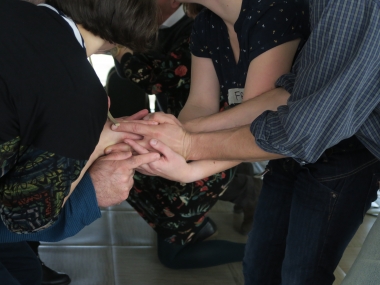The Gardeniser Toolkit is ready!
Edited on
18 February 2020Readers are probably wondering what is a Gardeniser and we hope that this article will help to clarify the mistery…The term comes from the union of the words “garden” and “organizer” and the Replay Network Training Agency (www.replaynet.eu), responsible for the training of this new professional figure, describes it in the toolkit that they have just produced as “ NOT a technician, NOT a landscape designer, NOT an expert, NOT a facilitator, NOT a trainer, NOT a counsellor, NOT a friend. IT'S ALL THAT TOGETHER!”.

The Gardeniser is no more expert than any other gardener but can help find a solution by putting together the needs of all the gardeners, especially when they do not coincide. The Gardeniser works the land, but the roots to be treated are the internal cohesion and the well-being of the group in the urban garden; the plant to grow is the relationship with the territory and with the institutions for a constructive dialogue and the recognition of the urban garden as a common good.
The need for such a professional figure within an urban garden is understood when we take a look at the evolution of the phenomenon of urban agriculture over the years in our European cities. At the beginning, their function was closely and substantially related to food production but quickly they became laboratories to support social cohesion and revitalize deprived neighbourhoods. Through community gardens citizens can play an active role for developing sustainable lifestyles and places in their cities. In this process citizens become the main actors of community empowerment and contribute to their own wellbeing. It is precisely in this new concept and role of an urban garden within the society that the Gardeniser comes into play: a key coordinating figure within the urban garden, holding a position half-way between an educator and a technician, a mediator between the gardeners and the institutions, with a role in the management and the organization of the urban garden to ensure its sustainability.
Two questions arise: 1) How to become a Gardeniser? 2) How does RU:RBAN contribute to raise awareness on this new professional figure? In recent years three EU funded projects (EU’GO, GARDENISER and GARDENISER PRO) identified this key role within the management of urban gardens, the core skills needed for the role, the required legitimacy for its transfer to other European cities and the creation of a European training format in the VET (Vocational Educational Training) field. The result was the development of a learning evaluation system to ensure high quality training of the Gardeniser and the recognition of this new professional figure, thus contributing to the Gardeniser’s employability. However, it is with RU:RBAN that this training pillar finds the grounds to be integrated in public policies. The project has embedded within its key elements the Gardeniser Vocational Training activity, one of the three key elements together with Capacity Building and Governance and has produced a Gardeniser Toolkit that reports the genesis of the figure of the Gardeniser, the evolution of the recognition of this figure at a European level, the characteristics of the Gardeniser and the training methods. An association of trainers, Replay Network, led the training activity in four Transnational Meetings of the project (Rome, Caen, Loures and Thessaloniki) in 2019 and conducted very successful Gardeniser training sessions. City representatives, stakeholders and ULG members (Urbact Local Group) of each partner city participated in these training sessions that included activities on how to deal with task and time management and how to learn about personal limitations and resources. The training sessions followed a “learning by doing” methodology that allowed participants to learn about themselves as well as developing interpersonal communication skills and team work strategies. During the four training sessions held in 2019, the participants became more acquainted with the necessary skills for their role in an urban garden: leadership, decision-making, trust-building, communication and conflict-management. They will receive a “Gardeniser Label”, a certificate that recognizes their participation in the Gardeniser training sessions. They are now able to recognize and support who in their community can fulfill the role of Gardeniser, unknowingly to him/her most of the times.
What happens after RU:RBAN? As a result of the enthusiasm shown by participants in the training sessions during the Transnational meetings of the project, followed by the request ULG members to continue this activity and train a higher number of local stakeholders, the partner cities have agreed upon the continuity of Gardeniser training activities beyond the end of the project. This alone can be consider an extraordinary success for RU:RBAN and a proof of the project’s impact on the territory.
For further information please contact: gardeniser@replaynet.eu
www.gardeniser.eu (available from March 2020)
 Submitted by Patricia Hernandez on
Submitted by Patricia Hernandez on
